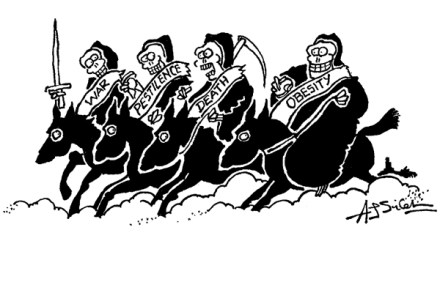Horsemen
‘He’s taken over from Famine.’

‘He’s taken over from Famine.’

‘It turns out you’re not A, B or AB but the much rarer ABBA blood group.’

‘Don’t touch me — this isn’t the Seventies.’

‘Bearing in mind your little boy’s issues with sugary drinks, we recommend you enrol him in the rehab crèche.’

‘Jack Sprat would eat no fat, his wife would eat no lean, no dairy, no wheat, no soya, no non-organic or GM food, no non-sustainable fish, no...’


Emoticon theatre



‘There are a lot of long passages.’
‘Some of us are, quite literally, fat cats.’


‘If you only knew what sacrifices your father is having to make to put you through university.’

‘Are you going to be much longer, Daddy? I’m trying to get to sleep.’
Worth the candle Sir: I was saddened by Charles Moore’s account of the Westminster Abbey candlelit vigil marking the centenary of the start of the first world war (The Spectator’s Notes’, 9 August). At each of the four quarters of the Abbey (representing the four corners of the British Empire), he notes, there was one

Tough at the top The clocks on Big Ben were cleaned by abseiling window-cleaners. Some other big cleaning/painting jobs: — Repainting the Forth Railway Bridge used to be a metaphor for never-ending work, but a new coating completed in 2012 is estimated to have a life of 25 years. — Sydney Harbour Bridge was, for

Home David Cameron, the Prime Minister, writing of the Islamic State in northern Iraq, said: ‘If we do not act to stem the onslaught of this exceptionally dangerous terrorist movement, it will only grow stronger until it can target us on the streets of Britain.’ Anyone waving an Islamic State flag in Britain would be arrested,
The tale is now familiar: shouts are heard from inside a freight container and police are called. A cargo of human beings is discovered, some gravely ill. This happened last Sunday along the Thames at Tilbury docks. Thirty-five Afghans were discovered. One of them, Meet Kapoor, was already dead. Days later, 15 Kashmiris and Eritreans


[audioplayer src=”http://traffic.libsyn.com/spectator/TheViewFrom22_21_August_2014_v4.mp3″ title=”Britain’s jihad, the Pope vs the Vatican, and the existence of ‘The One'” fullwidth=”yes”] The View from 22 podcast [/audioplayer]The murder of James Foley by an Isis fighter ‘with a London accent’ has been treated with understandable revulsion. But we shouldn’t be surprised, says Douglas Murray in his cover piece this week. On
